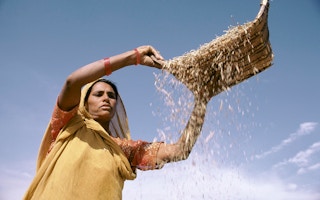India still does not map “the hazard, risks and vulnerabilities” affecting farmers at “a hyper-granular level”, said Abinash Mohanty, division head for climate change and sustainability at IPE Global, an international development organisation.
This limits understanding of the real impacts of climate change on people, he added.
In recent years, environmental groups have equipped some farm communities with weather information and alerts via text message, as well as resilient seeds for climate-smart farming.
State-run agricultural research institutions also issue weather-based advice on crops.
Yet drought is still forcing many farmers to migrate to cities for work, while some see no way out and end their own lives.
“The likelihood of these cases (of suicide) increasing in the future is high,” said the IIED’s Bharadwaj, whose assessment of rising risk is based on rainfall variation and suicide data.
Her team studied rainfall patterns between 2014 and 2021 in drought-prone Chhattisgarh, Karnataka, Madhya Pradesh, Maharashtra and Telangana states, which recorded the highest farmer suicides, and found more cases during periods of below-normal rainfall.
“Climate is a factor,” Bharadwaj explained. “But vulnerabilities like poverty, illiteracy and lack of social safety nets, or knowledge about how to access them, come together to create a difficult situation.”
Employment scheme
The IIED report recommends a shift from insuring against poor crop yields to insuring against bad weather, giving farmers an immediate payout when it hits, regardless of actual losses.
India’s rural job guarantee scheme - which promises 100 days of paid labour a year to each rural household - can also be a shock absorber, the report said.
The scheme created much-needed jobs during the Covid-19 pandemic when tens of thousands of people returned to their villages from cities as industries shut down. But its budget was trimmed this year and its implementation is increasingly patchy.
Peoples’ Action for Employment Guarantee (PAEG), a collective of academics and campaigners which tracks the scheme’s implementation, recorded a 30% fall in the work created this year up to April, compared to the same period last year.
There have also been problems with workers not getting paid, as attendance is now recorded using an app and some rural areas have poor phone networks, said M.S. Raunaq, a PAEG member.
IIED researcher Bharadwaj said she had found that regions where jobs were available under the scheme registered lower suicide numbers despite erratic rainfall.
But the scheme needs to offer better wages and more skills training to open up other job options beyond digging wells and canals and building school walls, researchers said.
For now, farmer Bheda said he and his fellow villagers are planning a protest this month at the district administrative office to demand work under the rural jobs scheme.
But he is not too hopeful, despite scoring a rare win this year: a payout of 48,000 rupees from the state crop insurance scheme for his losses last year.
“The money has gone to the bank, and it gets deducted there for loan repayment. I don’t want to be a loan defaulter or I lose my land,” he said.
When it comes to the troubles he is experiencing, the blame cannot be put on the climate alone, he added.
“The state has failed to protect farmers,” he said.
This story was published with permission from Thomson Reuters Foundation, the charitable arm of Thomson Reuters, that covers humanitarian news, climate change, resilience, women’s rights, trafficking and property rights. Visit https://www.context.news/.

















